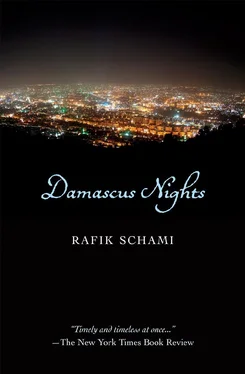The Bussard family belonged to the nomads of the Arabian desert. Following a failed uprising against the Ottoman sultan in the eighteenth century, the clan was dispersed and resettled. Salim's grandfather was held in a Damascus prison until his death; after that the family was not allowed to leave that city. Salim's father learned the art of tanning and prospered in that trade. His oldest son took over the small tannery; two others traded in leather goods. One son became a tailor. Another became a goldsmith but died of smallpox at an early age. Salim, the youngest, was named after his great-great-great-grandfather. From earliest childhood he was restlessness personified and caused his parents more trouble than all his five brothers combined. Occasionally he would disappear for weeks or months on end, only to return in rags and laugh himself silly at the punishments his parents would then impose. Instead of learning a trade, he spent his time running errands for the coachmen. From one caravanserai to the next he made his way across Arabia, Turkey, and Persia. It was even rumored on the street that he had spent a year in Morocco as an apprentice to a master of black magic. Salim himself would just laugh slyly whenever anyone asked; but he knew more about the habits and habitations of the Moroccan Berbers than any teacher of geography.
For thirty years Salim earned his bread as a coachman. When his son later emigrated to America and his beautiful daughter left with her wealthy husband to settle in the northern part of the country, Salim lived alone with his wife in a small room. In contrast to his beloved son, who sent letters but not a single dollar, Salim's daughter provided her parents with a small allowance. Old coachmen were not eligible for pensions.
Salim's wife, Zaida, was an unassuming person. She lived a quiet life. It was only after her death that Salim's neighbors discovered what a fiery and courageous woman she had been. Once she had disguised herself — as Salim told the story — as a black horseman and rescued him from seven armed soldiers who had come to conscript him. All the neighbors agreed that Salim had never served in the military — but no one could imagine little Zaida scaring off seven soldiers.
Every evening seven friends came to call on the old widower. They were all the same age, about seventy. A locksmith named Ali was the biggest among them; he was so big he practically took up the entire sofa. The last to join the old gentlemen had been the geography teacher, Mehdi, and although he had been coming for eight years, the others still referred to him as "our newcomer." Musa, a short and plumpish barber, was the only one in the group who still attempted to disguise his seventy years by dyeing his hair. The most elegant of the friends was the former statesman Faris. Shortly after Syria had gained independence he became minister of finance, and his radical reforms had earned him the popular nickname "the Red Pasha." Tuma, the fifth member of the circle, was known as "the emigrant" even though he had returned from America over ten years before. Junis, the cafe owner, was the only one of the gentlemen to whom all were grateful. It was in his coffeehouse that they had come to know one another over the years — Salim and Ali were the only ones who lived on the same street. For years they had gathered at the cafe: it was far and wide the only place you could sip a genuine Yemenite mocha and smoke a proper waterpipe. But ever since Junis' son had transformed the old-fashioned, Middle Eastern cafe into a flashy, modern bar, none of them went there anymore.
The seventh member of the group was a small man named Isam, who had served twenty-four years in prison for a terrible murder he did not commit. By chance, the true murderer was caught one year before Isam was to be released. For a man seventy years old, he was incredibly restless, as if he wanted to use his remaining years to make up for the time he had lost in prison. From Monday to Thursday afternoon he pulled a small cart loaded with vegetables through the city's more remote neighborhoods. At the Friday market he traded in songbirds. Saturdays and Sundays he sold toasted chickpeas in front of the movie houses.
Salim liked Ali the best. The locksmith said very little, but he enjoyed listening. He was the perfect complement to the talkative coachman; although he scarcely spoke, he would laugh at the slightest provocation. But that wasn't all. Salim praised Ali as the bravest man in the neighborhood. In the early forties he supposedly boxed a French general on the ear in the middle of the street. At the time the country was under French occupation. People say he did it because the general was drunk and making fun of the Prophet Mohammed, who forbade all alcohol. Ali didn't like to talk about it. But Salim the coachman described the general's terrible revenge in detail. He had Ali arrested and taken to a barracks outside Damascus. There they forced a gallon of red wine into his stomach with a funnel, then bound him to a stake in the scorching sun. When Ali lost consciousness the soldiers dragged him out of the barracks and dumped him in a ditch by the side of the road. A peasant family that was passing by found him and took him in. Naturally they didn't know what was wrong with him, since they had never heard of alcohol poisoning. But the old woman gave him a mixture of olive oil, yoghurt, and vinegar to make him vomit and in that way saved his life. Ali had to spend several days in bed at their house before he regained his strength. Meanwhile his family had learned of his arrest and had gone to the barracks to ask his whereabouts. All they received there was the cynical reply, "He's not here, maybe he's with the Prophet." When Ali had finally recovered his strength, he was too ashamed to return home. He made his way to a certain nightclub and waited a long time outside for the general to appear, then gave him a terrible beating. It was a wonder the man survived. Ali had to flee to the mountains, where he stayed until the French left the country four years later. Only Salim the coachman knew his whereabouts and secretly brought him food, clothing, and the latest news week after week.
The seven friends met every evening without exception. Whether it was raining or the Army was staging a coup, they arrived just before eight and didn't leave until after midnight. If one of them was sick and couldn't attend, his wife or a grandchild or a neighbor's child would bring a detailed explanation. Colds and similarly lame excuses didn't count.
I was the only child in the neighborhood whom the coachman allowed to stay when the old men arrived. In return I often had to play errand boy. This wasn't always the nicest of jobs, since the old men were so forgetful. The emigrant often forgot his tablets and sometimes his glasses, the cafe owner his snuff, and the former minister more than a few times forgot his elegant handkerchiefs — and no others would do. Sometimes I had to run these annoying errands in the rain, and their houses were scattered all across the city. Only coachman Salim never sent me anywhere. But he did once make me cross my heart and swear to him that I would never reveal a single word I had heard in his room. I swore by the soul of my grandmother Nadjla, whom I loved more than all the saints together, that I would keep every word to myself. But apart from Salim's nosy neighbor, Afifa, no one cared what the old men were talking about anyway; and besides, I never would have told anything to her, that two-legged radio station, even if she had tempted me with chocolate.
Now and then I had the feeling that the old men sent me out just so they could speak their minds a little more freely. I acted as if I didn't understand why one of them would ask me to fetch tobacco for the third time that day or why someone else would request a second tablet only an hour after he had asked for the first. Faris, the former statesman, was the worst. He could sneeze at will, whenever he so pleased, and completely fill his handkerchief with snot. Once outside I would dawdle underneath the window and eavesdrop on their secret stories, which usually began: "Now that the boy is gone…"
Читать дальше












